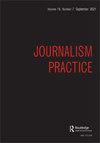津巴布韦的社交媒体和体育新闻
IF 2
2区 文学
Q2 COMMUNICATION
引用次数: 0
摘要
摘要社交媒体为全球体育新闻的生产、传播和消费开辟了新的空间。以前,传统媒体是传播体育新闻和评论的主要空间。尽管有这些转变,但很少有实证研究揭示了这些数字技术对全球南方国家的破坏性影响。利用Pfaffenberger的“技术剧”概念的见解,我们调查了津巴布韦的社交媒体如何重新配置体育新闻。此外,我们还评估了体育记者将社交媒体纳入日常新闻制作程序的方式。我们还研究了体育记者在多媒体环境中操作所需的适当数字技能和能力的程度。重要的是,我们强调了津巴布韦体育记者在数字时代面临的道德挑战。数据是通过对15名来自津巴布韦混合媒体生态系统的体育记者进行深入的半结构化采访收集的。调查结果显示,体育记者越来越依赖社交媒体进行新闻制作、分发和受众参与。多媒体体育记者面临的显著挑战包括数字设备和互联网连接的限制。关键词:体育新闻、社交媒体、信息伦理困境、多媒体技术戏剧、津巴布韦披露声明作者未报告潜在的利益冲突。本文章由计算机程序翻译,如有差异,请以英文原文为准。
Social Media and Sports Journalism in Zimbabwe
ABSTRACTSocial media has opened up alternative spaces for the production, distribution, and consumption of sports news across the world. Previously, legacy media were the main spaces through which sports news and commentaries were mediated. Despite these transformations, few empirical studies have unpacked the disruptive impacts of these digital technologies in the global South. Utilising insights from Pfaffenberger’s concept of “technological dramas”, we investigate how sports journalism has been reconfigured by social media in Zimbabwe. Further, we assess ways in which sports journalists are incorporating social media into their everyday newsmaking routines. We also examine the extent to which sports journalists have the appropriate digital skills and competencies required to operate in a multimedia environment. Importantly, we highlight the ethical challenges that Zimbabwean sports journalists are navigating in the digital age. Data was collected through in-depth semi-structured interviews with 15 purposively sampled sports journalists from across Zimbabwe’s hybrid media ecosystem. Findings show that sports journalists are increasingly depending on social media for news production, distribution, and audience engagement. Notable challenges facing multimedia sports journalists include limited access to digital devices and internet connectivity.KEYWORDS: Sports journalismsocial mediamisinformationethical dilemmasmultimediatechnological dramasZimbabwe Disclosure StatementNo potential conflict of interest was reported by the authors.
求助全文
通过发布文献求助,成功后即可免费获取论文全文。
去求助
来源期刊

Journalism Practice
COMMUNICATION-
CiteScore
5.50
自引率
14.30%
发文量
111
期刊介绍:
ournalism Practice provides opportunities for reflective, critical and research-based studies focused on the professional practice of journalism. The emphasis on journalism practice does not imply any false or intellectually disabling disconnect between theory and practice, but simply an assertion that Journalism Practice’s primary concern is to analyse and explore issues of practice and professional relevance. Journalism Practice is an intellectually rigorous journal with all contributions being refereed anonymously by acknowledged international experts in the field. An intellectually lively, but professionally experienced, Editorial Board with a wide-ranging experience of journalism practice advises and supports the Editor. Journalism Practice is devoted to: the study and analysis of significant issues arising from journalism as a field of professional practice; relevant developments in journalism training and education, as well as the construction of a reflective curriculum for journalism; analysis of journalism practice across the distinctive but converging media platforms of magazines, newspapers, online, radio and television; and the provision of a public space for practice-led, scholarly contributions from journalists as well as academics. Journalism Practice’s ambitious scope includes: the history of journalism practice; the professional practice of journalism; journalism training and education; journalism practice and new technology; journalism practice and ethics; and journalism practice and policy.
 求助内容:
求助内容: 应助结果提醒方式:
应助结果提醒方式:


